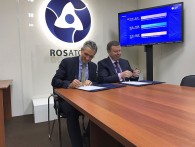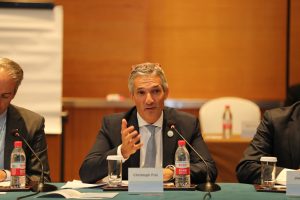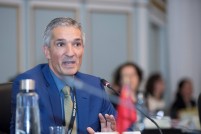St Petersburg International Forum

I am pleased to say Russia’s Energy Minister Alexander Novak appointed a new Executive Director of the Council’s Russian national member committee during the Forum. More than 900 speakers and moderators took part in the Forum on 1-2 June and covered a wide range of topics including socio-economic development, energy, transportation, the environment, healthcare, culture, tourism, education, and science.
Presence at 8th Clean Energy Ministerial
During the 8th Clean Energy Ministerial held in Beijing on 6-8 June China, the Council presented a deep dive of its Energy Trilemma work to two Chinese provinces, Shandong and Heijiang. I highlighted the importance of our Trilemma framework work in assisting the Chinese delegation in narrowing the current skill deficit in policymaking and challenges currently facing such provinces in China.

Discussions focused on four different topic areas of energy sector digitalisation and the various policy elements that can help realise their potentials:
-
Big data and machine learning for system analytics to enable applications such as automated demand response and predictive variable renewable energy supply chain management.
-
Connected devices making up the Internet of Things enabled by blockchains to ensure cross-sector operation for optimised energy productivity systems and smart grids.
-
Platform solutions to enable customers as they become distributed energy producers (for example through solar roofs) and implement energy management systems (for example through connected devices within their dwellings).
-
Innovative market solutions that properly capture the opportunities presented by energy sector digitalisation.
18th European Gas Conference in Stavanger
On 13- 14 June, I gave a speech on ‘Energy Markets & Politics’ to delegates at the 18th European Gas conference in Stavanger, Norway. The conference attracted key energy players in the global gas industry, including Shell, Exxon, Total, IHS, Snam, and the International Gas Union, as additional speakers, who reflected on major changes emerging in the energy markets in Europe and beyond. Norway's Ministry of Foreign Affairs (MOFA) organised a dedicated workshop to discuss the Council's flagship studies. I also had a meeting with Statoil representatives as well as the Norwegian Ministry of Petroleum (MPE). Statoil was part of the organising committee of this conference together with MPE, Gassco and the Norwegian Petroleum Association.
The Global Sustainable Electricity Partnership, which has its General Secretariat in Montréal, is an international not-for-profit organisation that was founded in 1992 after the Rio Summit. Previously known as e8, it is made up of the largest electric utilities in the world. The mission of its members is to play a proactive role in the global debates on key electricity industry issues and to promote sustainable development by means of knowledge-transfer projects and programs geared to the electricity sector in developing countries around the world.
Siemens Grid Masters Summit
On 23 May, I gave a presentation on digitalisation and transformation to an audience at the Grid Masters Club Summit 2017, organised by one of our partners, Siemens, in Bilbao. I highlighted the role of digitalisation, and how it fits into the overall energy global transformation. These drivers include three main topics: Decarbonisation, shifts in business models, and energy resilience.
In the past 45 years, the average rate of decarbonisation has been around 1% per year. To keep temperature rises below 2°C, this needs to be 6% per year. This requires a revolution, not an evolution. Another way of trying to put a value on the rate of decarbonisation is to look at fossil reserves. We currently have 2,800 Gt of reserves of these, but to not exceed the 2°C target, we could only burn 1,000 Gt. These figures mean that geopolitics will get tougher. The Paris climate change deal gets no more than one third of the way to meeting the temperature change target.
Business models are changing from ‘big plant’ to ‘Big Data’. Although technology, experience, and operational excellence are important, the increasing significance of data intelligence and service quality cannot be overlooked. But how does digitalisation stand behind shifts to business models? New financing mechanisms and micro-leasing schemes are enabled in parts of the world where there were none before. For example, rural electrification is a reality today and is enabled by digitalisation. Artificial intelligence and Big Data digitalisation are important. This enables automated system responses and analytics, automated demand response, and predictive maintenance. This also inherently allows tracing of carbon content, renewable content, in an unprecedented way.





